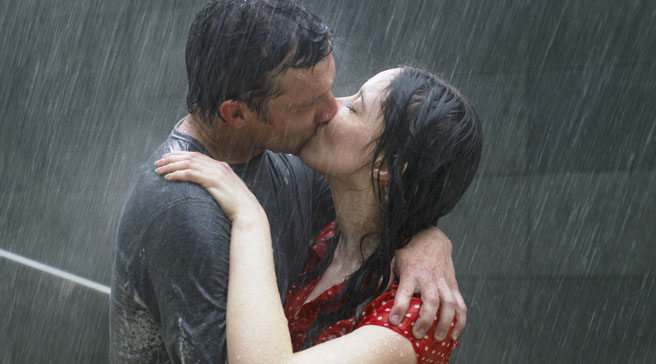Could you fall in love at first sight?
Your eyes meet, your heart races – within minutes you know you’re in love. Is Instant mutual attractionjust a matter of chance or can we all make it happen? By Helene Fresnel

When Melanie, 42, fell in love at first sight she was having a coffee in a local café. ‘I got the impression someone was watching me,’ she says. ‘I looked up and saw a man with greying hair, who was smiling at me. I thought, I could do with a man like that. He looks happy but thoughtful. I could spend my life with someone like him.’ The feeling was mutual and a few minutes later he came over to talk to her. ‘I said to myself, “Yes. From now on you only say yes”. Since then I’ve never stopped saying yes to him.’
Anyone who has felt this instant attraction describes the experience as dramatic, intense and overwhelming. As psychologist Linda Blair says: ‘The feeling can make you feel unbelievably alive. It can knock you flat in any situation, and you shouldn’t view it with suspicion.’ That sense of physical and emotional intensity – your heart pounding, your eyes lighting up – is something we’d all like to experience. So is it just random, or can we all make it happen this way?
Yes, we can, says psychoanalyst Roland Gori, who believes we can create a frame of mind where we’re more likely to fall in love instantly. ‘We need to believe that, on some level, something is missing from our lives,’ he explains. ‘When we feel “complete”, that we’ve found everything we want, we’re not as open to the possibility that someone else can heal our pain.’
Whereas if we’re feeling vaguely dissatisfied, someone can appear exactly when we need them to. When we’re feeling down, we’re more open to the romantic notion that someone can walk in and save us. Which is why love at first sight is something we find so desirable, particularly when we’ve been through a difficult time or struggled with sorrow and depression.
‘It’s at these moments you can understand what passion really is,’ says Gori. ‘Someone catches our eye and we lose our reason. This may be more likely to happen to people who are susceptible to eye contact: holding the gaze of another person feels like an intense and intimate connection.’
It also happens to people who are less inhibited, more open to chance. If we consciously look for love, we’re less likely to find it. Instead we need to cultivate a genuine feeling of being available without necessarily wanting anything to happen. ‘Everyone could potentially feel the connection of instant love, even those who don’t consciously want to,’ says psychiatrist and psychoanalyst Didier Lauru. ‘But some conditions need to be in place, and these have nothing to do with the desire to experience these emotions’.
When Louise, 37, met Patrick in Hong Kong, she didn’t have the least intention of falling in love. ‘I’d just begun a round-the-world trip with a friend,’ she says. ‘I really wasn’t looking for an emotional attachment. I wanted to have fun, to discover new places. I wanted to travel. We were at the beginning of our journey and I felt very available, very free. I went to a bar with my friend, and his flatmate Patrick walked in. From the moment I set eyes on him, I heard a little voice in my head saying something I always think is ridiculous when I hear other people saying it – “I want him”. He seemed strangely familiar. He sat down beside me and ordered two beers, announcing that he intended to get really drunk. We drank, we talked. We kissed, I think. I don’t really remember very clearly. We left together in a taxi, both drunk. On the way back to my hotel he patted me on the leg, laughing, and said, “I need to marry someone like you”.’ Then the taxi dropped Louise at her hotel.
The next day, she left with her friend. ‘I wasn’t sad, I just told myself that if it was meant to happen, it would.’
Two months later, when she was back at work in London, she got a call – from Patrick. ‘He was visiting and remembered where I worked, so he looked it up in the phone book. Ten years later we are still living together and have two children.’ Given this idyllic scenario, who wouldn’t want to experience love at first sight? Yet such an instant connection doesn’t guarantee a long and happy relationship, something many psychologists often warn us about.
‘I would say it’s more lust at first sight – it’s physical attraction, which is fine, but real love takes longer to develop,’ says Blair. ‘We feel love at first sight when we believe we have met someone who understands us,’ says Gori.
Whether they do or not is less significant. ‘I felt as though I was lost and someone came along to tell me where I was,’ writes the French surrealist André Breton. ‘When we experience love at first sight we idealise the other person,’ explains Lauru. ‘We feel certain that this person will complete us’.
We are also, Lauru believes, drawn back to our earliest unconscious memories; the physical connection between mother and newborn when they first gaze at one another. It is probably the rarity of love at first sight that makes it even more desirable. Lauru says if we experience it even once in our lifetime, we’ll be lucky. And if that chance encounter leads to a lasting relationship, even luckier.
More inspiration:
Read 3 signs you are ready for a proper relationship by Madeleine Mason on LifeLabs









